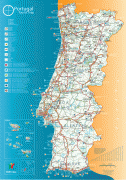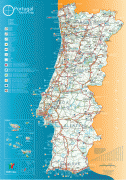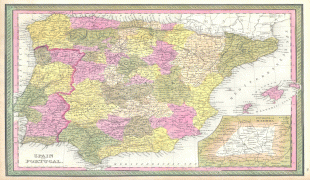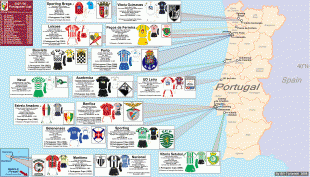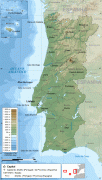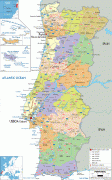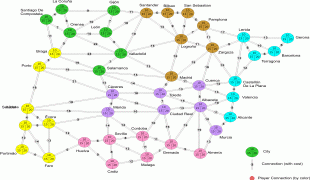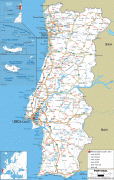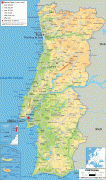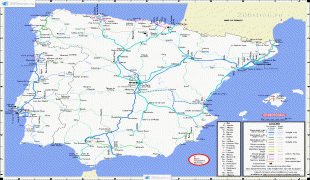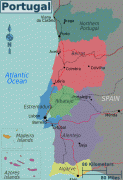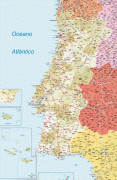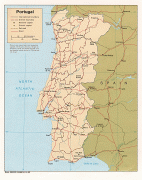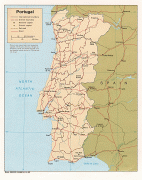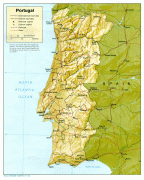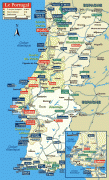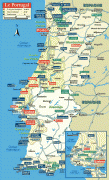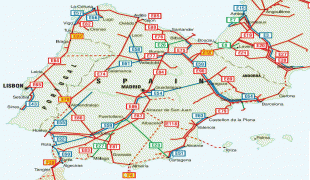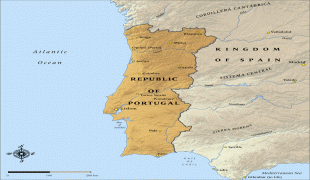Portugal (Portuguese Republic)
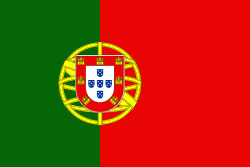 |
 |
| Flag of Portugal | |
One of the oldest countries in Europe, its territory has been continuously settled, invaded and fought over since prehistoric times. The territory was first inhabited by pre-Roman and Celtic peoples who had contact with Phoenicians, ancient Greeks and Carthaginians. It was later ruled by the Romans, followed by the invasions of Germanic peoples and the Islamic invasion by the Moors, whose rule was eventually expelled during the Reconquista. Founded first as a county of the Kingdom of León in 868, gained its independence as the Kingdom of Portugal with the Treaty of Zamora in 1143.
In the 15th and 16th centuries, Portugal established one of the longest-lived maritime and commercial empires, becoming one of the main economic and political powers of the time. At the end of the 16th century, however, Portugal suffered a war for the crown succession which led to the incorporation of the country into the Spanish monarchy during the Iberian Union.
By the early 19th century, the accumulative crisis, events such as the 1755 Lisbon earthquake, the country's occupation during the Napoleonic Wars, and the resulting independence of Brazil in 1822 led to a marked decay of Portugal's prior opulence. This was followed by the civil war between liberal constitutionalists and conservative absolutists over royal succession, which lasted from 1828 to 1834. The 1910 revolution deposed Portugal's centuries-old monarchy, and established the democratic but unstable Portuguese First Republic, later being superseded by the Estado Novo (New State) authoritarian regime. Democracy was restored after the Carnation Revolution (1974), ending the Portuguese Colonial War and eventually losing its remanent colonial possessions.
Portugal has left a profound cultural, architectural and linguistic influence across the globe, with a legacy of around 250 million Portuguese speakers around the world. It is a developed country with an advanced economy which holds the 14th largest gold reserve at its national central bank, the 8th largest proven reserves of lithium, with the weight of exports representing 49% of its GDP in 2022 and high living standards. Additionally, it ranks highly in peacefulness, democracy, press freedom, stability, social progress, prosperity and English proficiency. A member of the United Nations, the European Union, the Schengen Area and the Council of Europe (CoE), Portugal was also one of the founding members of NATO, the eurozone, the OECD, and the Community of Portuguese Language Countries.
The word Portugal derives from the Roman-Celtic place name Portus Cale; a city where present-day Porto and Vila Nova de Gaia (New village of Gaia) now stand, at the mouth of the River Douro in the north of what is now Portugal. The name of the city is from the Latin word for port or harbour, portus, but the second element of Portus Cale is less clear. The mainstream explanation for the name is that it is an ethnonym derived from the Castro people, also known as the Callaeci, Gallaeci or Gallaecia, who occupied the north-west of the Iberian Peninsula. The names Cale and Callaici are the origin of today's Gaia and Galicia.
Another theory proposes that Cale or Calle is a derivation of the Celtic word for 'port', like the Irish caladh or Scottish Gaelic cala. These explanations, would require the pre-Roman language of the area to have been a branch of Q-Celtic, which is not generally accepted because the region's pre-Roman language was Gallaecian Celtic, usually considered P-Celtic. However, scholars like Jean Markale and Tranoy propose that the Celtic branches all share the same origin, and placenames such as Cale, Gal, Gaia, Calais, Galatia, Galicia, Gaelic, Gael, Gaul, Wales, Cornwall, Wallonia and others all stem from one linguistic root.
Another theory has it that Cala was the name of a Celtic goddess (drawing a comparison with the Gaelic Cailleach, a supernatural hag). Some French scholars believe the name may have come from Portus Gallus, the port of the Gauls or Celts.
Around 200 BC, the Romans took the Iberian Peninsula from the Carthaginians during the Second Punic War. In the process they conquered Cale, renaming it Portus Cale ('Port of Cale') and incorporating it in the province of Gaellicia with its capital in Bracara Augusta (modern day Braga, Portugal). During the Middle Ages, the region around Portus Cale became known by the Suebi and Visigoths as Portucale. The name Portucale evolved into Portugale during the 7th and 8th centuries, and by the 9th century, that term was used extensively to refer to the region between the rivers Douro and Minho. By the 11th and 12th centuries, Portugale, Portugallia, Portvgallo or Portvgalliae was already referred to as Portugal.
The 14th-century Middle French name for the country, Portingal, which added an intrusive /n/ sound through the process of excrescence, spread to Middle English. Middle English variant spellings included Portingall, Portingale, Portyngale and Portingaill. The spelling Portyngale is found in Chaucer's Epilogue to the Nun's Priest's Tale. These variants survive in the Torrent of Portyngale, a Middle English romance composed around 1400, and "Old Robin of Portingale", an English Child ballad. Portingal and variants were also used in Scots and survive in the Cornish name for the country, Portyngal.
Currency / Language
| ISO | Currency | Symbol | Significant figures |
|---|---|---|---|
| EUR | Euro | € | 2 |
| ISO | Language |
|---|---|
| PT | Portuguese language |






